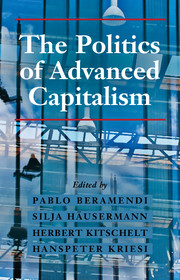Book contents
- Frontmatter
- Contents
- List of Figures
- List of Tables
- List of Contributors
- Preface
- 1 Introduction: The Politics of Advanced Capitalism
- PART I STRUCTURAL TRANSFORMATIONS
- Part II Politics
- Part III Policies
- Part IV Outcomes
- 13 Constrained Partisanship and Economic Outcomes
- 14 Happiness and the Welfare State: Decommodification and the Political Economy of Subjective Well-Being
- 15 Conclusion: Advanced Capitalism in Crisis
- Reference
- Index
15 - Conclusion: Advanced Capitalism in Crisis
from Part IV - Outcomes
Published online by Cambridge University Press: 05 May 2015
- Frontmatter
- Contents
- List of Figures
- List of Tables
- List of Contributors
- Preface
- 1 Introduction: The Politics of Advanced Capitalism
- PART I STRUCTURAL TRANSFORMATIONS
- Part II Politics
- Part III Policies
- Part IV Outcomes
- 13 Constrained Partisanship and Economic Outcomes
- 14 Happiness and the Welfare State: Decommodification and the Political Economy of Subjective Well-Being
- 15 Conclusion: Advanced Capitalism in Crisis
- Reference
- Index
Summary
We began this project spurred by our skepticism of diagnostics proclaiming the convergence in terms of outcomes and policy among advanced industrial societies, a view only invigorated by the financial crisis that began in the fall of 2007. In this interpretation, the crisis operates as the catalyst of a long-expected return of capitalism to its pre-1945 normalcy, marred by extremely slow improvements of people's quality of life and by a structural determinism asserting the power of capital and sweeping away the importance of institutional differences (cf. Schäfer and Streeck 2013; Streeck 2014). In this process, the key mechanisms at work are global trade openness, labor migration to rich countries, and especially the free and speculative movement of capital. Jointly, they unravel preexisting industrial relations systems and exert downward pressures on wages and standards of living. The decline in aggregate demand, in turn, contributes to slowing economic growth, rising long-term unemployment, and a dualization of labor markets with a rapidly eroding core of protected insiders. This process coincides with an increasing concentration of wealth and incomes at the individual and household levels, reinforced by a switch to less progressive forms of taxation (Piketty 2014). Faced with this specter, electoral elites engage in a defensive insulation (“cartelization”), trying to shelter themselves from populist challengers who call upon the incumbents to listen to the citizens' grievances. The breakdown of political representation, in turn, fuels popular dissatisfaction and cynicism with democracy and partisan competition, an erosion of public trust and civic-mindedness, as well as a decline of political participation in all of its expressions.
Our volume has challenged the claim that there is increasing uniformity and convergence in the processes, outputs, and outcomes of politics in postindustrial capitalist democracies. There is a continuous stream of challenges originating from the realms of demographics, technology (and related patterns of consumption), and the global system of production and finance.
- Type
- Chapter
- Information
- The Politics of Advanced Capitalism , pp. 381 - 404Publisher: Cambridge University PressPrint publication year: 2015
- 4
- Cited by



